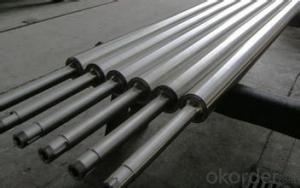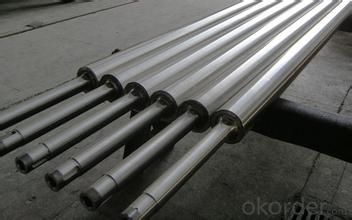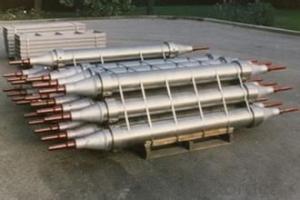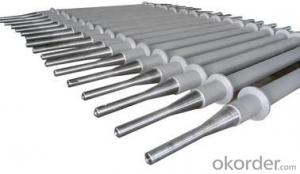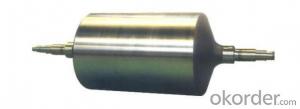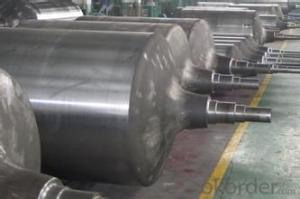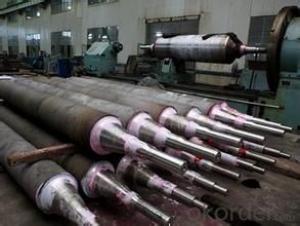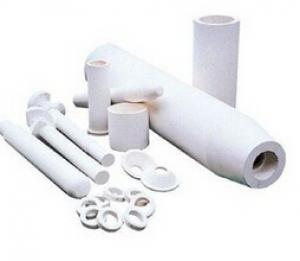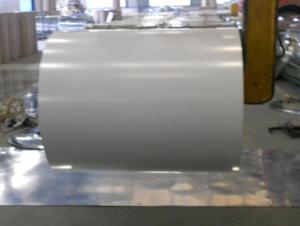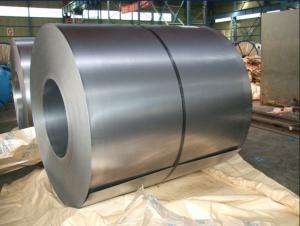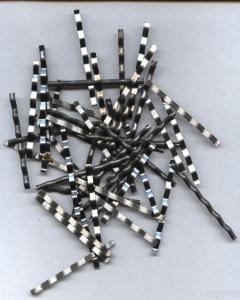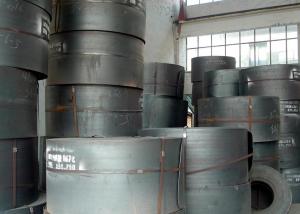Roll Differential Temperature furnace
- Loading Port:
- Tianjin
- Payment Terms:
- TT OR LC
- Min Order Qty:
- 1000 PCS
- Supply Capability:
- 10000 PCS/month
OKorder Service Pledge
OKorder Financial Service
You Might Also Like
Quick Details
| Condition: | New | Type: | Resistance Furnace,Furnace | Usage: | Heat Treatment Furnace |
| Place of Origin: | Brand Name: | Model Number: | RT | ||
| Processing Type: | Machining Equipment |
Packaging & Delivery
| Packaging Detail: | 2000 |
| Delivery Detail: | 90 |
Usage:The heat-treatment of iron parts,such as:normalizing,annealing and quenching.
Structure Instruction:The full-fiber gas trolley furnace is combine with furnace shell,lining,trolley and door,microcomputer control systems,etc.
The furnace shell welded by steel,and the lining formed by full-fiber refractory.
Features:
1.The full-fiber refractory made by light compound materials,lighter and more refractory.
2.The microcomputer control systems formed with temperature control system, combustion control systems, pressure automatic control system, cooling control systems, fault alarm system and power control system.They could easily to achieve the safety automation production.
3.The door use the upper and lower open-type,and full-fiber self-tight sealing system.
4.The fuel could be gas or oil.
- Q: What are the different types of steel wires and their applications in the telecommunications industry?
- There are several types of steel wires used in the telecommunications industry. Some common ones include galvanized steel wires, aluminum clad steel wires, and stainless steel wires. Galvanized steel wires are coated with a layer of zinc, which provides corrosion resistance. They are commonly used for overhead transmission lines and communication cables. Aluminum clad steel wires are made by covering a steel core with a layer of aluminum. These wires combine the strength of steel with the light weight and conductivity of aluminum. They are often used in the construction of overhead power lines and telecommunication cables. Stainless steel wires are known for their high strength and resistance to corrosion. They are used in the telecommunications industry for applications that require durability and reliability, such as guy wires for cell towers and suspension cables for overhead lines. Overall, steel wires play a crucial role in telecommunication infrastructure, providing support, strength, and conductivity for various applications in the industry.
- Q: What are the different types of steel railway products available?
- There are several types of steel railway products available, including rails, sleepers, fasteners, and turnouts. Rails are the long steel beams that tracks are laid upon, while sleepers are the wooden or concrete supports that the rails are fixed to. Fasteners, such as clips or bolts, are used to secure the rails to the sleepers. Turnouts, also known as switches or points, are sections of track that allow trains to change from one track to another.
- Q: What are the different types of steel reinforcement used in construction?
- There are various types of steel reinforcement used in construction, including mild steel bars, deformed steel bars, welded wire mesh, and steel fibers.
- Q: What are the environmental impacts of producing steel products?
- The environmental impacts of producing steel products include emissions of greenhouse gases during the production process, such as carbon dioxide and methane. Steel production also contributes to air pollution through the release of particulate matter, sulfur dioxide, and nitrogen oxides. The extraction of raw materials for steel production, such as iron ore and coal, can result in habitat destruction and deforestation. Additionally, the energy-intensive nature of steel manufacturing leads to significant consumption of natural resources, including water and energy. Proper management and implementation of sustainable practices are crucial to minimize these environmental impacts.
- Q: What are the different types of steel sheet and their uses?
- There are several types of steel sheets, including hot rolled, cold rolled, galvanized, and stainless steel sheets. Hot rolled sheets are commonly used in construction, fabrication, and general manufacturing due to their strength and malleability. Cold rolled sheets are often used for applications requiring precise dimensions and a smooth surface finish, such as automotive body panels or appliances. Galvanized sheets have a protective zinc coating and are widely used in outdoor applications to prevent corrosion, such as roofing or fencing. Stainless steel sheets, known for their resistance to corrosion and high strength, are commonly used in industries like food processing, medical equipment, and architectural design.
- Q: What are the different types of heat treatment processes for steel?
- There are several different types of heat treatment processes for steel, including annealing, normalizing, quenching, tempering, and case hardening.
- Q: What are the different methods of shaping steel into desired forms?
- There are several methods of shaping steel into desired forms, including forging, casting, rolling, and extrusion.
- Q: How are steel products used in the construction of schools and educational institutions?
- Steel products are widely used in the construction of schools and educational institutions for various purposes. They are commonly used in the structural framework, such as columns, beams, and trusses, to provide support and stability to the buildings. Additionally, steel is used in the construction of roofs, walls, and floors due to its durability and ability to withstand heavy loads. Steel products also play a crucial role in the construction of doors, windows, and other architectural features, ensuring safety and security. Overall, steel products are essential in creating sturdy and long-lasting educational facilities.
- Q: What are the different grades of steel and their applications?
- There are several grades of steel, each with its own unique properties and applications. Some common grades include mild steel, which is a versatile and widely used grade for general construction and fabrication purposes; stainless steel, known for its corrosion resistance and used in kitchen appliances, medical equipment, and chemical processing; high carbon steel, used for making cutting tools and machinery parts that require high strength; and alloy steel, which contains various elements to enhance its strength, durability, and heat resistance, commonly used in automotive and aerospace industries. These are just a few examples, and there are many more grades of steel available, each tailored for specific applications based on their composition and properties.
- Q: How is steel used in the production of laboratory equipment?
- Steel is used in the production of laboratory equipment due to its durability, corrosion resistance, and high heat resistance. It is commonly used to manufacture items such as lab benches, cabinets, fume hoods, and various tools and instruments.
Send your message to us
Roll Differential Temperature furnace
- Loading Port:
- Tianjin
- Payment Terms:
- TT OR LC
- Min Order Qty:
- 1000 PCS
- Supply Capability:
- 10000 PCS/month
OKorder Service Pledge
OKorder Financial Service
Similar products
Hot products
Hot Searches
Related keywords
